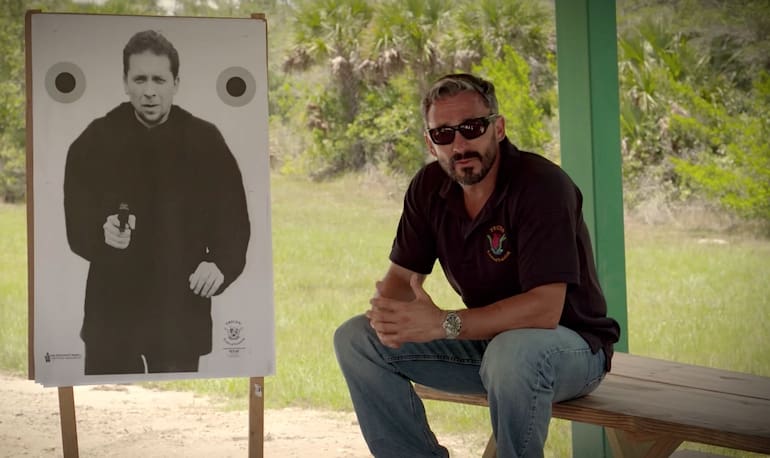A common remark I hear in our classes: how easy sleep comes at the end of the day. How mentally tired students my students are after a full day of training and how surprised they are at their level of mental exhaustion . . .
No duh…
It shouldn’t come as a surprise that concentration takes an effort. To be successful in any activity requires a constant effort and constant concentration.
You might think a person with good shooting skills doesn’t need to concentrate as much as a piker. Wrong. Skill level is not always relevant. While someone with poor shooting skills has to concentrate on a new activity, those with good shooting skills have to concentrate to maintain a high level of performance. That’s not always an easy task.
https://youtu.be/LEZ_xL1S4hs
Be like Dug the Dog
Here’s the main advice I give students trying to focus: remove distractions.
When a shooter’s concentration is broken due to a distraction all sorts of bad things can happen, from poor performance to safety violations leading to a negligent discharge. You need to clear clutter from your work area. Remove anything that’s not directly related to helping improve your performance: your range bag, casual shooting buddy, “extra” guns, everything.
You don’t need to bring everything but the kitchen sink to the firing line. All those items not directly connected to improving your performance are a distraction. Instead of focusing on a specific skill set you need to master, you start wondering how new equipment can make things better. A bad artist blames his tools. ‘Nuff said?
Simple, but not easy
Working through bad habits requires an intense level of concentration. I know it sounds simple, but removing distractions allows you to concentrate more efficiently. Strike a balance between concentration and suppression. Concentrate on what matters for peak performance and suppress the distractions that inhibit peak performance.
KISS
When you’re practicing your shooting, don’t distract yourself by attempting to focus on multiple tasks. Concentrate on one improvement at a time. Keep it simple, stupid.
Take a break!
I often see students’ performance suddenly crash. Their inability to sustain concentration is the usual culprit. When that happens, it’s time to take a break. Allow for a 10-15-minute recharge.
While most of my students aren’t up for a star jumps or other calisthenics (at least in front of their classmates), a quick bit of stretching is an excellent alternative. Nothing fancy, something to get the blood flowing and clear the head. It’ll help you reach those high levels of concentration again.
New Year’s Resolution
Sustained focus takes preparation, concentration and a working knowledge of your limitations. Make focus your focus your training goal in 2018 and you’ll see significant improvement in your safety and skill.





Get a set of TruGlo TFO or TFX sights…Keep both eyes open….superimpose sight picture on target….press the trigger….the rounds will impact where they are suppose to be!!
Yeah I used to compete in weightlifting and bodybuilding. I know how to concentrate. Sadly old age has degraded things like eyesight and reflexes…I do the best I can and don’t overthink anything.
I have to take 30 second stretch breaks at work all day from concentration.
The flip side is, is that I sleep like a log during the week.
Nyet! Accuracy by volume comrade!
What is this, the NYPD?
Just a thought… If you train always with zero distractions… how does that translate into a situation in real life when you can’t help but have plenty of distractions? I think one needs to train to function in SPITE of distractions.
If you are training ONLY for target shooting perfection, well I suppose this advice is good… but if you are training to defend yourself and others, it might be self defeating. You WILL have all kinds of distractions in that case, and you’d better be prepared to deal with them.
MamaLiberty,
You bring up a good point.
I am thinking that a two-step approach is probably superior.
Step 1: initial training without distractions
Step 2: continued training with distractions
Step 1 helps you build solid fundamentals including “muscle memory” and proper mental actions (training yourself out of “tunnel vision”).
Step 2 helps you be able to apply those solid fundamentals in spite of distractions.
Thinking about this some more… I wonder how in the world one would train with zero distractions at all. Every class I’ve taken has had lots of other people in the same place, doing relatively dangerous things, and I think it would be insanity not to give those others and what they’re doing at least a LITTLE attention.
The last class I took was a good example. The man next to me on the firing line muzzled me … I noticed and asked him to stop it. He did it again a little later, and I stepped back to talk to the instructor… who didn’t SEE it either time. Then he watched, and on the third incident muzzling me, the instructor asked the unsafe guy to leave. But if I had not been paying attention, the error and danger would simply have gone on.
I’ve had the serious distraction of a poor instructor too, covering a number of issues.
So, unless you are “training” in an isolated place like a rubber room, all alone, there WILL be distractions, some or many of which will need to be addressed. Personally, I’m not giving up situational awareness anywhere, any time.
Personally, I recommend people try competition, like IDPA. You get noise, people, movement, problem solving, and the pressure of a timer and other things that most people who train on static ranges never get to experience with a gun in their hand.
It’s amazing, though, how many people who have never been in gun fights will reply that competition is fake and will totally get you killed in the real world. I’ve been in two, and I’m still here, but what do I know?
One size does not fit all. Training with a gun is not much different than much of the rest of our lives, if we apply the lessons we get along the way. I worked as a triage nurse in an emergency room, and was a charge nurse for a busy med/surg floor later. I learned a great deal about dealing with people, noise, confusion, making decisions under stress. The better we handle life itself, the better we’ll be able to deal with any situation involving a gun. Practice with a gun is very important, of course, but it cannot stand alone.
Agree — it’s all mindset and experience.
If you are an active learner, open-minded, efficient, and can recognize the objective from your training / learning experiences and then incorporate it efficiently into training, you will better your odds in a real life scenario.
If you are a know-it-all tacticool gear head with no time to learn new things because you think you know everything, even the very “best” training and advice will be wasted on you and will be of no benefit when you find yourself in a real life scenario.
Keep it simple, train often, and always be ready to listen and learn.
Sometimes it’s just nice to turn money into brass and noise.
But for anything else, treat it as training and show up with a plan. And by plan, I mean write it down.
What do you want, how will you get those results, and what do you need to accomplish those results? It’s really simple, and your shooting will dramatically increase if you treat your range time as training time, not just as noisy-fun time.
As an aside, if you are shooting a pistol and you don’t have to take a break every 15 minutes or so, you aren’t gripping the gun tight enough.
If the author would get a little more sleep, perhaps he would be alert enough to not write(and publish,) such words as how “mentally tired students my students are”.
Good luck with that…
Comments are closed.